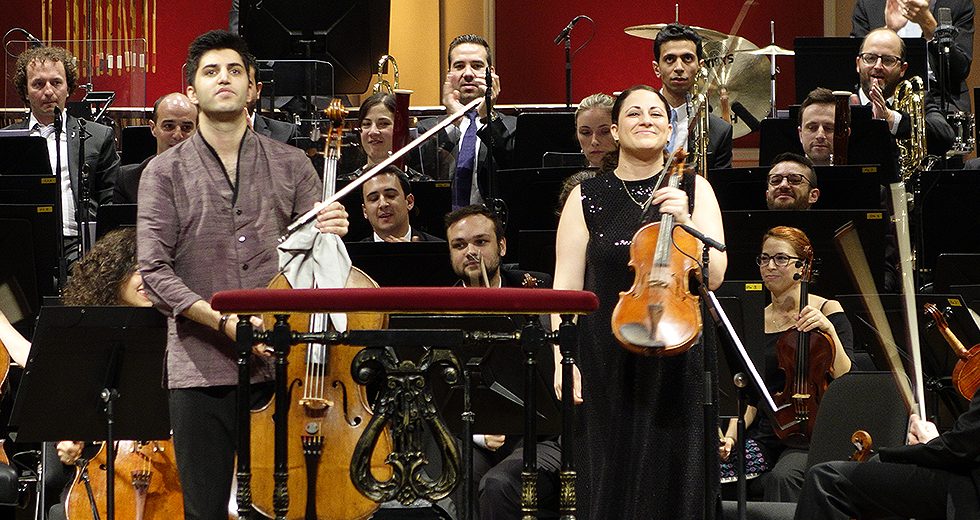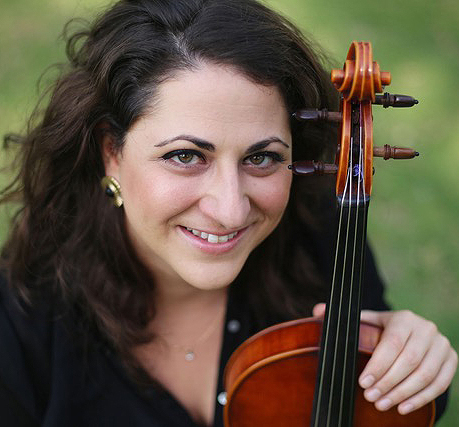
Conductor Daniel Barenboim and author-scholar Edward Said organized an orchestra in 1999 that would bring together aspiring Israeli and Arab musicians who otherwise would have little chance to meet, let alone with play each other.
What began as a kind of experiment has gone on to become a world-renowned ensemble, with the quality of its musicianship growing alongside the respect it has accrued across the bitter Middle Eastern divide as an ambassador of peace and goodwill.
The Berlin-based West-Eastern Divan Orchestra, which Barenboim continues to lead, will perform in an SCP Special Concert Nov. 5 as part of five-city American tour. It also will visit such prestigious venues as the Kennedy Center in Washington, D.C. (Nov. 7), and Walt Disney Concert Hall in Los Angeles (Nov. 11).

Miriam Manasherov
Featured on its program will be Tchaikovsky’s Symphony No. 5 and Richard Strauss’ 1898 tone poem, Don Quixote, Op. 35. Based on Miguel de Cervantes’ celebrated novel, the latter is structured as a 45-minute theme and variations, with the solo cello representing Don Quixote and the solo viola, bass clarinet and tuba alternately playing the role of his squire, Sancho Panza.
The soloists will be Miriam Manasherov, 37, an Israeli violist, and Kian Soltani, 26, an Austrian-Persian cellist. Manasherov was a charter member of the orchestra in 1999, staying for two years, and then returned in 2012. Soltani auditioned five years ago and began touring with the ensemble a year later.
In interviews with Sounds and Stories, the two discussed their experience with the West-Eastern Divan Orchestra and Barenboim:
What has been different about playing with this group vs. other orchestras you have been a member of?
Miriam Manasherov: First and foremost is the maestro. He sets the tone. Even 20 years ago, he always treated us like adult professionals. He never gave us any slack. He really rehearsed us until he thought we had reached our highest point. Of course, it’s not only about the music and working with Maestro Barenboim. It’s also meeting people you would never have the chance to meet [otherwise], working with them and making friends. There are people who are still there, like me, since ’99, so it’s always a great opportunity to see us growing together.

Kian Soltani
Kian Soltani: It’s really a special energy every time you go onstage. The rehearsals you would say are fairly normal, like any other ensemble with the exception, of course, that there is Barenboim standing in front of you, and he was the most demanding musician I had ever worked with at that time. That was certainly something new for me. But in terms of the people, I felt like everything was quite normal until we went onstage, and that was first time I really realized the energy of the orchestra, especially being projected back by the audience.
The moment this orchestra steps onstage, the whole audience really feels something special is about to happen and gives you this incredible energy. Already, the applause just walking onstage is so much bigger than any other ensemble I ever played with. The first concert was the most magical thing, and the energy in the orchestra was so great. We all feel like we’re bringing an important message to the world, and that’s what makes it special.
How would you describe the ensemble’s level of musicianship?
MM: Actually, a few days ago a good friend of mine and I thought about it — how many great people have come out of the orchestra, working with the best orchestras and ensembles in the world. We have people in the Berlin Philharmonic and people working in the Israeli Philharmonic and Qatar. So I think the level is very high and everyone can say that working with the maestro gave us a lot of tools to take to our professional lives.
What has it been like to collaborate with Daniel Barenboim?
MM: Along my career, I have met a lot of great musicians, but I think none of them have left a mark on me like the maestro did. And I think a lot of us can say that.
What interested you about performing with the ensemble?
KS: I had heard a lot about them. They have a lot of attention in the media and so on. This idea really fascinated me. But, of course, also the whole reputation around Barenboim was also a big aspect of what drew me to the orchestra. It was kind of a perfect mixture between working for something you believe in and at the same time having the privilege and possibility to work with one of the greatest conductors of our time.
TOP: The West-Eastern Divan, with soloists Kian Soltani (left) and Miriam Manasherov, takes a bow after a concert in Buenos Aires. | Photo: Manuel Vaca